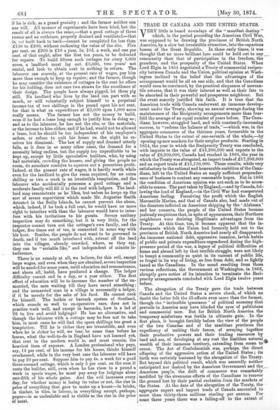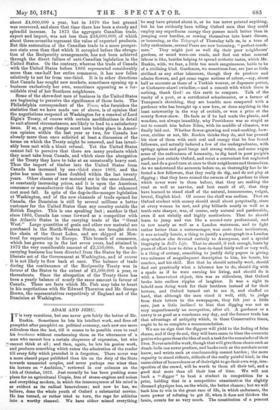TRADE IN CANADA AND THE UNITED STATES.
VERY little is heard nowadays of the " manifest destiny " which, in the period preceding the American Civil War, was supposed to be drawing the provinces of British North America, by a slow but irresistible attraction, into the capacious bosom of the Great Republic. In those early times, it was thought that no more brilliant lure could be held out to any___. community than that of participation in the freedom, the grandeur, and the prosperity of the United States. When Lord Elgin in 1854 negotiated a Treaty of commercial recipro- city between Canada and the Union, political opinion at Wash- ington inclined to the belief that the advantages of the arrangement would be all on one side, and that the Canadians would soon be convinced, by the practical eloquence of mercan- tile returns, that it was their interest as well as their fate to be absorbed in their powerful and prosperous neighbour. But the event scarcely justified this faith. It is true that the American trade with Canada underwent an immense develop- ment under the Treaty, showing an annual average during the maintenance of the Reciprocity arrangements more than four- fold the average of an equal number of years before. The Cana- dians, however, struggled hard, and with constantly-increasing success, to "redress the balance of trade,"—which was, in the aggregate commerce of the thirteen years, favourable to the United States to the extent of one-seventh of the whole,—by opening up new markets for their surplus products. Starting in 1854, the year in which the Reciprocity Treaty was concluded, with imports to the value of £13,200,000 and exports to the value of £8,300,000, Canada had reached in 1866, the year in which the Treaty was abrogated, an import trade of £17,200,000 and an export trade of £15,750,000. These results, while very satisfactory to the rational and honourable ambition of the Cana- dians, left to the United States an amply sufficient preponder- ance of business to content any reasonable hopes. But in 1866 the condition of American opinion was not such as to be acces- sible to reason. The part taken by England,—and by Canada, fol- lowing the lead of England,—in the Civil War had exasperated American feeling. Perceiving the profit which the English Mercantile Marine, and that of Canada also, had made out of the disasters inflicted on American shipping by the 'Alabama' and her consorts, the people of the United States became jealously suspicious that, in spite of appearances, their Northern neighbours were deriving illegitimate advantages from the Treaty. At this time, too, it became apparent that the in- ducements which the Union had formerly held out to the provinces of British North America had nearly all disappeared. An immense national debt, oppressive taxation, lavish habits of public and private expenditure engendered during the high- pressure period of the war, a legacy of political difficulties at home and abroad left by that terrible struggle, were not likely to tempt a community so quiet in its current of public life, so frugal in its way of living, so free from debt, and so lightly taxed as the Canadians. In the mood resulting from these various reflections, the Government at Washington, in 1866, abruptly gave notice of its intention to terminate the Reci- procity arrangements concluded with Lord Elgin twelve years before.
The abrogation of the Treaty gave the trade between Canada and the United States a severe check, of which no doubt the latter felt the ill-effects even more than the former, though the " invincible ignorance " of political economy that prevails in America may have blinded the eyes of politicians and commercial men. But for British North America the temporary misfortune was fertile in ultimate gain. In the first place, it brought forcibly before the view of the people of the two Canadas and of the maritime provinces the expediency of uniting their forces, of arraying together their productive powers and their trading resources by land and sea, of developing at any cost the limitless natural wealth of their immense territory, extending from ocean to "i• ocean. The Act of Confederatioh was, perhaps, the direct offspring of the aggressive action of the United States ; its birth was certainly hastened by the abrogation of the Treaty. But beyond this political result, which was assuredly neither anticipated nor desired by the American Government and the, American people, the drift of commerce was remarkably modified by the strenuous efforts of the Canadians to recover the ground lost by their partial exclusion from the markets of the States. At the date of the abrogation of the Treaty, the aggregate export and import trade of Canada amounted to more than thirty-three millions sterling per annum. For some three years there was a falling-off to the extent of about £4,000,000 a year, bnt in 1870 the lost ground was recovered, and since that time there has been a steady and splendid increase. In 1873 the aggregate Canadian trade, export and import, was not less than £48,000,000, of which about three-sevenths represent the value of exported products. But this restoration of the Canadian trade to a more prosper- ous state even than that which it occupied before the abroga- tion of the Reciprocity arrangements, has not been achieved through the direct failure of anti-Canadian legislation in the United States. On the contrary, whereas the trade of Canada with the United States before 1866 represented considerably more than one-half her entire commerce, it has now fallen relatively to not far from one-third. It is in other directions that Canada has sought new markets, sometimes opening up a business exclusively her own, sometimes appearing as a for- midable rival of her Southern neighbours.
Some of the shrewdest men of business in the United States are beginning to perceive the significance of these facts. The Philadelphia correspondent of the Times, who furnishes the statistics that we have made use of above, is of opinion that the negotiations reopened at Washington for a renewal of Lord Elgin's Treaty, of course with certain modifications in detail to suit altered circumstances, are likely to lead to a satisfactory issue. If so, a great change must have taken place in Ameri- can opinion within the last year or two, for Canada has already more than once solicited at least a discussion of the terms on which the Treaty might be renewed, and has invari- ably been met with a blunt refusal. Yet the United States cannot fail to perceive that there are many products which they must take from Canada, and which since the abrogation of the Treaty they have to take at an unnaturally heavy cost. Thus the import of timber into the United States from Canada has increased by one -third since 1866, and the price has much more than doubled within the last twenty years. Other classes of raw material are in the same demand, at constantly increasing prices, and it is upon the American consumer or manufacturer that the burden of the enhanced cost must fall. In spite of the dog-in-the-manger legislation at Washington, and of the new channels of trade opened for Canada, the Dominion is still by several millions a better customer for the United States than any country outside the British Empire. This is one speaking fact ; another is that since 1866, Canada has come forward as a competitor with the Atlantic States in the carrying trade of the " Great West." Large quantities of grain and other raw material are purchased in the North-Western States, are brought down the chain of the Great Lakes, and are shipped at Mon- treal for exportation to Europe. This branch of commerce, which has grown up in the last seven years, had attained in 1873 the very considerable amount of £2,550,000. So much carrying business has been diverted from the States by the de- liberate act of the Government at Washington, and of course it is not likely to flow back at once. The balance of trade during the continuance of the Reciprocity Treaty was in favour of the States to the extent of £1,500,000 a year, or thereabouts. Since the abrogation of the Treaty there has been a yearly balance of nearly the same amount in favour of Canada. These are facts which Mr. Fish may take to heart in his negotiations with Sir Edward Thornton and Mr. George Brown, the representatives respectively of England and of the Dominion at Washington.



































 Previous page
Previous page